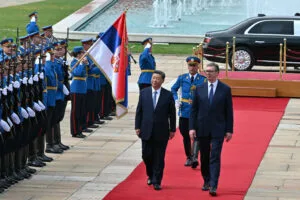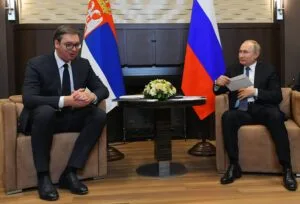Brussels – A “steel” bond that “no one will be able to break.” Not the one between Serbia and the European Union, but between Serbia and China. These are the words the Serbian president, Aleksandar Vučić, chose to welcome his Chinese counterpart, Xi Jinping, today (May 8) in Belgrade on his European tour that also took him to Paris and Budapest. It was a stage laden with symbolism for Serbia-China relations (it marks the 25th anniversary of the NATO bombing of Belgrade that also hit the Chinese embassy), the tones of which once again highlighted Vučić’s distance from the line that the Union he would like to join is trying (with difficulty) to hold vis-à-vis Beijing.

“China has never turned its back on Serbia; they stood by us even 25 years ago; you are always welcome in your second home,” was the welcome with all honours to the Chinese president by the Serbian leader, referring to the NATO bombings in the spring of 1999 condemned by Beijing. An attitude that does not completely conceal a good deal of provocation toward the European Union, from foreign to economic policy. “As a small country, we face pressure from different sides because of the autonomous policy we pursue. We ask you for support,” is Vučić’s request to one of the countries that cause the most concern in Brussels, with implicit reference to the non-alignment to EU sanctions against Russia for the invasion of Ukraine. Over the past two years, the Serbian president had to balance in order not to become the pariah in Europe—with total opposition to the EU’s hard line against the Kremlin—but at the same time not to find himself forced to sever ties with Moscow by adopting international sanctions. And it is precisely because of the Chinese backing (and Beijing’s ambiguity toward Russia) that Vučić is able to carve out a space for manoeuver that would otherwise be untenable, conversely demonstrating the immobility of the EU in taking countermeasures.

Another issue on which Serbia finds support from China is undoubtedly that of territorial sovereignty and the non-recognition of Kosovo’s independence (declared unilaterally in 2008), despite the fact that Brussels has been engaged in mediating a very difficult dialogue for normalization of relations between Belgrade and Pristina for more than ten years. “The two countries firmly support each other’s interests on the basis of sound political relations,” Xi Jinping confirmed, “China supports Serbia in defending its independence and course of development.” On this front, too, it is more sustainable for the Serbian leader to continue to obstruct what has been negotiated diplomatically with Brussels while the Union seems unable to react with the same rigidity it has assumed toward Pristina. For Beijing, the bargaining chip is the recognition of Taiwan as an integral part of China, an issue not particularly thorny in Belgrade: “We are loyal friends,” Vučić confirmed about another issue of distance from the caution that the European Union is instead seeking (always keeping in mind that Serbia is a candidate country for membership).
Then there is economic and trade policy, precisely one of the two issues of “vital interest” to the European Union at the centre of the trilateral summit on Monday (May 6) in Paris between the Chinese president, his French counterpart, Emmanuel Macron, and the number one of the EU Commission, Ursula von der Leyen. “Serbia and China are moving from having strategic relations to the common future of our two countries; it is the highest form of cooperation, and I am proud to have been able to sign it today,” rejoiced Vučić, speaking of the Joint Declaration signed today for the strengthening of the comprehensive strategic partnership between Beijing and Belgrade: “It charts the direction for the development of our bilateral relations.” The two leaders signed a total of 28 agreements and memoranda of understanding from infrastructure to culture, from sports to technology—including the purchase of nine electric trains for the Balkan country’s railways, while the Belgrade-Budapest high-speed railroad will be completed by 2026 with Chinese support—and whose trajectory cannot fail to worry Brussels: “Serbia becomes the first European country with which we will build a community for a common future,” the Chinese president added.
To conclude the roundup of sibylline statements, if not outright provocations towards the European Union, President Vučić also wanted to point out that China “is our main investor and second-largest trading partner,” with exports from Belgrade to Beijing having “increased 140-fold in the last ten years, and with the Free Trade Agreement [of October 2023, ed.] we will be able to export almost 95 per cent of the products we produce without tariffs.” The Serbian leader, however, forgot to mention the trade value of this relationship and the abysmal difference with what is at stake with the EU: if in 2022, China was moving 5.8 billion (in euros) between exports (4.7) and imports (1.1), in the same year Serbia was importing 21.39 billion and exporting 17.69 billion to the EU, for a total of €39.08 billion (six times more than Beijing).
Find more insights on the Balkan region in the newsletter BarBalcani hosted by Eunews
English version by the Translation Service of Withub








